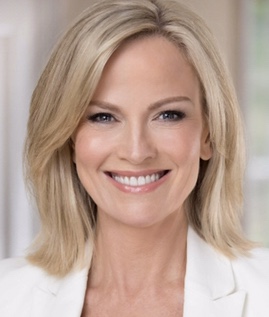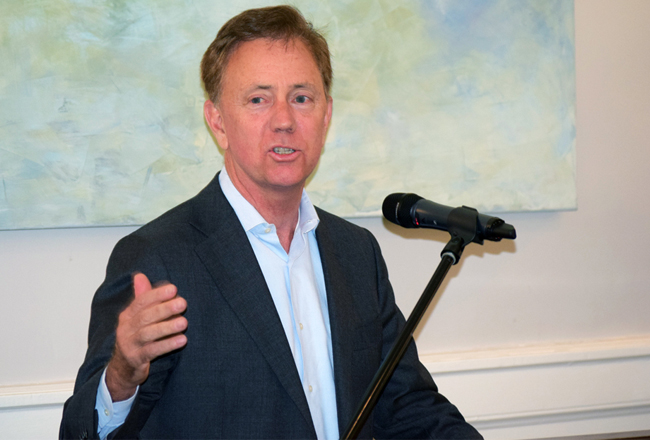
Upon meeting Patricia Stark, it is easy to assume she has never suffered a moment”™s worth of self-doubt. A former television news anchor and commentator, she has also been a frequent guest lecturer at universities and women”™s leadership conferences, and her consulting firm Patricia Stark Communications includes major media organizations, publicly traded companies and iconic entertainment brands among her clients. In theory, she epitomizes the confidence, can-do spirit of a media and marketing professional.
But during the promotion of her first book, “Calmfidence: How to Trust Yourself, Tame Your Inner Critic, and Shine in Any Spotlight,” Stark freely admitted that there was a time when she was not confident in her own skin. In creating the book, the Rockland County resident acknowledged that she was too familiar with the demographic who have been burdened with insecurities throughout most of their lives.
“I know because I was one of them,” she said. “And I’ve worked with a lot of people also who have had to overcome their own fears and insecurities with that. That’s why the book has a lot of stories of clients and students in it ”” to really show that it is possible to shift gears and have a growth mindset and know that you can work in that direction and ultimately get to some level of calm and confidence, depending on where your starting point is.”
Stark initially conceived the book in 2007 while attending a book writing conference in California. While most of her work had been on camera and before a live audience, she was eager to share her thought to readers rather than viewers.
“I think initially it was because books and audio books on both personal and professional development really had a big impact on my life and on my career,” she explained. “It was something that I always hoped I could give back one day. And when I started my coaching and training company, I knew it was something I was working toward.”
Stark first plotted the book for an audience of business professionals who needed advice for public speaking or being on camera, but as she developed the text she realized that “it was a truly a hybrid book between personal development and personal growth and professional development that everybody could use ”” because who doesn’t need more calm and confidence in their lives?”
For many people, public speaking is among the least popular activities. Stark observed there is a key stumbling point that flummoxes people when they find themselves with an audience that they really would prefer not to have.
“I think that the first thing that overwhelms us is that we get this incredible feeling of self-focus,” she stated. “We’re extremely focused ”˜On how do I sound? How do I look? What if I make a mistake? What if I sound stupid? What if I sound silly?”™ It’s very, extremely, hyper-self-focused.”
The solution that she offers is for the speaker to shift the focus elsewhere and not make it about themselves.
“How can you make it be not about yourself?” she continued. “How can you focus on ways that you’re going to be of service, to either have a teacher”™s mindset or a volunteer”™s mindset where you shift the focus from worrying about how you look and sound to ”˜Okay, these people are here and I have information that can hopefully benefit them in some way ”” let me focus on that.”™”
In “Calmfidence,” Stark has a section on why people should listen to their “inner coach” rather than their “inner critic” ”” a difficult assignment, she noted, for people with a tendency to accentuate the negative.
“I think that it’s very easy to listen to our inner critic ”” it is something that all of us have and it doesn’t go away,” she said. “It’s something that we share in common with each other. I think that it is just a scared child ”” it’s really us in the back of our mind that it’s trying to protect us. It’s a very primitive ego type of place that just wants to think worst case scenario, so that we can kind of tried to plan.
“But the problem with that,” she added, “is we’re really good at visualizing and imagining what could go wrong, almost to the point where we can condition our subconscious to say, ”˜Okay, you did a great job of visualizing all this horrible stuff, so we’re going to head in that direction.”™ It’s going to be a self-fulfilling prophecy.”
Stark emphasized that the inner coach often emerges when one gives a sympathetic word to a friend or loved one, remarking that voice is “the same voice that we can speak to ourselves with. Rather than saying, ”˜What if I don’t get the job? What if I fall on my face?”™, you should say ”˜No, you’ve got this ”” you’ve done your homework and here’s your plan.”™”
“Calmfidence” also considers the role of natural foods and remedies in building self-esteem. Stark recalled learning from Broadway performers how they would rely on bananas as a natural muscle relaxer between shows while media professionals working long hours snacked on dark cherries to fuel their performance. She recommended these strategies rather than habit-forming offerings such as alcohol, which could create more problems than solutions.
Stark pointed out that the Covid-19 pandemic created new stresses for those with self-confidence issues, and the eventual emergence from remote work back to some degree of pre-pandemic normalcy will only exacerbate the stresses of the past two years.
“I know so many people that want to be informed, but they don’t want to be inundated constantly with worry or bad news or the what ifs,” she said, adding that she”™s seen evidence of people taking control of their stress levels. “A lot of people have been taking a little bit of a diet from media and being on their phone a lot ”” they’ll check in to make sure they’re not missing anything important, but they’re really trying to get back to old school ways of being in touch and not being so bombarded constantly with everything that’s vying for our attention.”





















